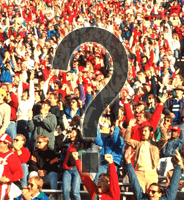|
Mary Lou Weissman: "Sports Gesture Etiquette" (2/01/02)
The Olympics are just around the corner and that means thousands of athletes, officials and fans are heading toward the winter wonderland of Salt Lake City. After all, it's the snow and ice that provide the landscape for those gold-medal performances.
 Salt Lake has been through a lot of turmoil, given the bribery scandals leading up to the Games, but they're now ready to play host to the world. And since there's a certain balance to be achieved between acting as gracious host and enthusiastic fan, let's have a word with our etiquette guru, Mary Lou Weissman. Salt Lake has been through a lot of turmoil, given the bribery scandals leading up to the Games, but they're now ready to play host to the world. And since there's a certain balance to be achieved between acting as gracious host and enthusiastic fan, let's have a word with our etiquette guru, Mary Lou Weissman.
Mary Lou explore what we do as fans -- cheering, the wave, whistling, shaking our banners and fists -- and how these things mean different things to different people. How different cultures interpret hand gestures at sporting events? While applause may be universal, her are some other international gestures that apply to the Olympic situation.
- When Europeans whistle at sporting events, they are signaling disapproval -- or, even derision.
- The "A-OK" sign -- making a circle of your thumb and index finger -- means the rather impolite form of "derriere" in too many countries to risk it. Nixon flashed a two fisted "A-OK" sign on what turned out to be a "bad-will" trip to Latin America.
- In France, pushing one's nose upward with the first two fingers is a way of saying, "Oh, that's so easy I could do it with my fingers up my nose."
- Giving the finger and the forearm jerk are universally understood.
- You can't even trust the "thumbs up" gesture. It's a negative in Australia and Nigeria -- where it is interpreted as "up yours."
- THE "V" for VICTORY, or peace signs, also means "up yours" when the palm faces inward.
- And you really can't win. Keeping your hands in pockets is considered rude by the French, the Japanese, and the Belgians.
Return to Feature Archive
|




 Salt Lake has been through a lot of turmoil, given the bribery scandals leading up to the Games, but they're now ready to play host to the world. And since there's a certain balance to be achieved between acting as gracious host and enthusiastic fan, let's have a word with our etiquette guru, Mary Lou Weissman.
Salt Lake has been through a lot of turmoil, given the bribery scandals leading up to the Games, but they're now ready to play host to the world. And since there's a certain balance to be achieved between acting as gracious host and enthusiastic fan, let's have a word with our etiquette guru, Mary Lou Weissman.